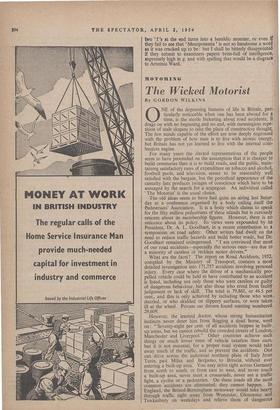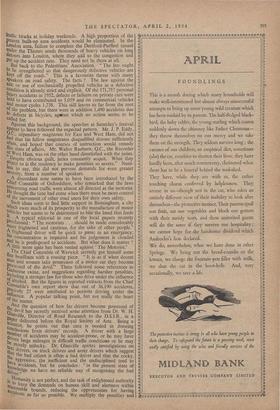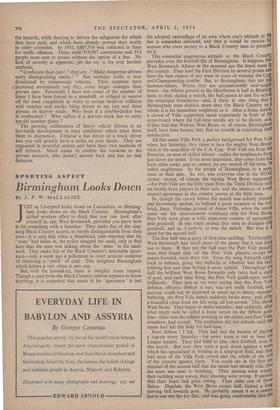MOTORING
The Wicked Motorist
By GORDON WILKINS NE of the depressing features of life in Britain, par- ticularly noticeable when one has been abroad for it, time, is the sterile bickering about road accidents; it drags on with no beginning, and no end, with meaningless repe- tition of stale slogans to take the place of constructive thought.
The few minds capable of the effort are now deeply engrossed with the problem of how man is to live with atomic energy. but Britain has not yet learned to live with the internal com- bustion engine.
For many years the elected representatives of the people seem to have proceeded on the assumption that it is cheaper to build cemeteries than it is to build roads, and the public, main- taining satisfactory rates of expenditure on tobacco and alcohol, football pools, and television, seems to be `reasonably well Satisfied with the bargain, but the periodical appearance of the casualty lists produces twinges of conscience which have to be assuaged by the search for a scapegoat. An individual called ' The Motorist' is the usual choice.
The old ideas seem to have had quite an airing last Satur- day at a conference organised by a body calling itself the Pedestrians' Association. It is a body which claims to speak for the fifty million pedestrians of these islands but is curiously reticent about its membership figures. However, there is no reticence about its policy. Its views were expounded by its President, Dr. A. L. Goodhart, in a recent contribution to a symposium on road safety. Other writers had dwelt on the need to reduce traffic hazards and build better roads, but Dr. Goodhart remained unimpressed. " I am convinced that most of our road accidents—especially the serious ones—are due to a minority of careless or reckless motor drivers." What are the facts? The report on Road Accidents, 1952, compiled by the Ministry of Transport, contains a most detailed investigation into 171,757 accidents involving personal injury. Every case where the driver of a mechanically pro- pelled vehicle could be held to have contributed to an accident is listed, including not only those who were careless or guilty of dangerous behaviour, but also those who erred from faulty, judgement or lack of skill. The total is 79,861, or 46.5 per cent., and this is only achieved by including those who were dazzled, or who skidded on slippery surfaces, or were taken ill at the wheel. Private car drivers found wanting numbered 29,609.
However, the learned doctor, whose strong humanitarian instincts never deter him from flogging a dead horse, went on : " Seventy-eight per cent. of all accidents happen in built- up areas, but we cannot rebuild the crowded streets of London, Manchester and Liverpool." Other countries achieve such things on much lower rates of vehicle taxation than ours, but it is not essential, for a proper road system would take away much of the traffic, and so prevent the accidents. One can drive across the industrial northern plain of Italy from Turin, past Milan and Bergamo, to Brescia, without • ever entering a built-up area. You may drive right across Germany from north to south, or from east to west, and never touch a built-up area, never meet a crossroads, never see a traffic light, a cyclist or a pedestrian. On these roads all the most common accidents are eliminated; they cannot happen. In England, the Bristol-Birmingham motorway would take heavy through traffic right away from Worcester, Gloucester and Tewkesbilry on weekdays and relieve them of dangerous traffic blacks at holiday weekends. A high proportion of the present built-up area accidents would be eliminated. In the London area, failure to complete the Dartford-Purfleet tunnel Under the Thames sends thousands of heavy vehicles on long detours into London, where they add to the congestion and Put up the accident rate. They need not be there at all. But back to the Pedestrians' Association. " The law ought to be strengthened so that dangerously defective vehicles are kept off the roads." This is a favourite theme with many sPeakers on road safety. The facts ? The law against the sale or use of mechanically propelled vehicles in a defective co, ndition is already strict and explicit. Of the 171,757 personal injury accidents in 1952, defects or failures on private cars were held to have contributed to 1,059 and on commercial vehicles and motor cycles 1,738. This still leaves us far from the root of the problem, but there were in addition 1,490 accidents due to defects in bicycles, against which no action seems to be called for. Against this background, the speeches at Saturday's festival appear to have followed the expected pattern. Mr. J. P. Eddy, QC., stipendiary magistrate for East and West Ham, did not feel that his fellow magistrates disqualified drivers sufficiently often, and hoped that courses of instruction would remedy this state of affairs. Mr. Walter Raeburn, Q.C., the Recorder of West Ham, was on the other hand dissatisfied with the juries. Despite obvious guilt, juries constantly acquit. What they leIect to is the tendency to make penalties so severe." Need- s to say, this did not prevent demands for even greater severity, from a number of speakers. A discordant note seems to have been introduced by the Chief Constable of Oxfordshire, who remarked that the laws ,eoncerning road traffic were almost all directed at the motorist. /l thought the time had come when there must be more control of the movement of other road users for their own safety. Such ideas seem to find little support in Birmingham, a city Which owes much of its prosperity to the manufacture of motor vehicles but seems to be determined to bite the hand that feeds A typical editorial in one of the local papers recently Proclaimed " The motorists . . . should be made considerably nAtore frightened and cautious, for the sake of other people." L. frightened driver will be quick to panic in an emergency; u..sts concentration is impaired and his judgement is clouded t ci thtlee ims prreedipsipo sheda st ob eaecnc ideennttesd. aBguaitn what hdeo eMs oit omrastt.e'r? the hazards, while denying to drivers the safeguards for which they have paid, and which have already proved their worth in other countries. In 1952, £687,514 was collected in fines for traffic offences. There were 319,987 convictions and 914 people were sent to prison without the option of a fine. No lack of severity is apparent, yet the cry is for ever harsher methods, " Confiscate their cars ! " they cry. " Make dangerous drivers carry distinguishing marks ! " But weekday traffic is now dominated by commercial vehicles. Their numbers have *increased enormously and they cover larger mileages than private cars. Personally I have lost count of the number of times I have been forced to a standstill, or obliged to swerve off the road completely in order to escape head-on collision with coaches and trucks being driven at me two and three abreast on narrow roads. Who loses if a double-decker bus is confiscated ? Who suffers if a ten-ton truck has to carry special number plates The growing ruthlessness of heavy vehicle drivers is an inevitable development in road conditions which must drive them to distraction. Criticise a bus driver or a truck driver and you will quickly have a strike on your hands. They are organised in powerful unions and have their own methods of self defence. Much easier to confine the vendetta to the private motorist, who doesn't answer back and has no real defences.




















































 Previous page
Previous page